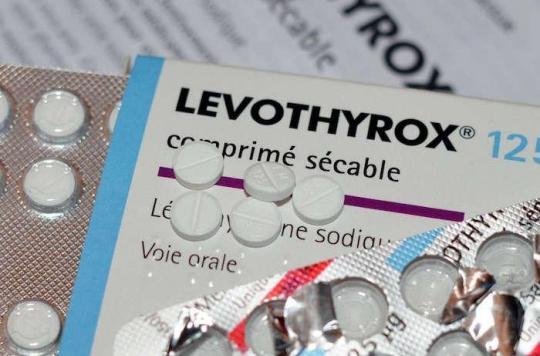The undesirable effects with the new formula of Levothyrox would be related to a “hormonal imbalance”, related to variations of intake compared to the old formula. But are you more inclined to hyperthyroidism or hypothyroidism?

According to the ANSM, the undesirable effects reported since the arrival of the new Levothyrox are due to “a thyroid imbalance” caused by the change of formula, and not to the new formula itself. This is what emerges from the first results of the pharmacovigilance survey, according to which “no adverse effects of a new type, which would be specific to the new formula alone, were not found”.
In search of “more stability”
According to its press release, the ANSM continues: “Any change of specialty or formula can modify the hormonal balance and require a readjustment of the dosage” which can take “a certain delay”.
It is recalled that the new formula of Levothyrox was requested by the ANSM at the Merck laboratory in 2012 in order, according to it, to make the product more stable over time. The change therefore does not relate to the active principle (the thyroid hormone) or its dosage, but to other substances (the excipients), supposed to be amorphous and intended to allow the manufacture of the tablet.
A “thyroid imbalance” therefore, while waiting for the end of the investigation, but in practice, to rebalance, it is necessary to know if one is in slight hyperthyroidism or in slight hypothyroidism compared to the previous formula.
Hyperthyroidism, an increase in the functioning of the body
In hyperthyroidism, all the metabolic processes in the body are somehow “accelerated”: the heart rate is rapid and permanent and can become irregular, the function of the intestines is also accelerated (diarrhea), the sweat glands sweat too much and the patient is too hot all the time and puts on less clothing than other people around him. The nervous system is also stimulated, so that the patient becomes hyperactive, irritable and nervous, with tremors of the hands. Despite a marked increase in appetite, a person loses weight, both fat and muscle, because the normal diet is unable to meet the needs necessary to meet the accelerated breakdown of protein. Menstruation disorders are also found which are scant, painful or absent, as well as an increase or decrease in libido.
But in the case of a hormonal imbalance linked to a small variation in doses, the signs to look for are more discreet : a simple unusual but sustained increase in appetite, a feeling of being too hot and not supporting the heat, a slight rise in temperature of the hands which are hot and sweaty, excessive sweating with excessive thirst. We can also find an elevated heart rate above 80 beats per minute and permanent, palpitations, a fine, rapid and regular tremor of the hands, nervousness, restlessness, emotional fragility, chronic diarrhea …
Hypothyroidism, a slowing down of the body’s functioning
Signs of hypothyroidism are caused by insufficient thyroid hormone levels compared to what is needed, which causes metabolic processes to slow down.
The affected person may experience physical and mental fatigue, drowsiness, a drop in body temperature with acquired reluctance, constipation, slowing of the heart, modest weight gain sometimes contrasting with loss of appetite, stiffness muscle, muscle cramps and pain. There may be a muscle deficit which predominates on the roots of the limbs. The person with hypothyroidism may also have memory problems. A depressive state or a delirium syndrome are more common in the elderly.
There may also be various menstrual disorders, libido disorders and an absence of ovulation with difficulty in having children. Hypothyroidism can present as an isolated attack of the heart with heart failure.
But in the event of moderate under-dosage of Levothyrox, linked to a small variation in doses, the signs to look for are rather persistent fatigue with drowsiness, a drop in body temperature and acquired chilliness, constipation, slowing of the heart, muscle cramps and pain and menstruation disorders …
These disorders can be intense enough to poison everyday life, and hormone levels (TSHus) are not necessarily contributing as the variation can be small and remain within normal limits. It is the difference compared to the old assays measured in the same laboratory that can be contributory. It will be necessary, with your doctor, to adjust the doses with very small variations, upwards or downwards, to regain the lost balance.
.















